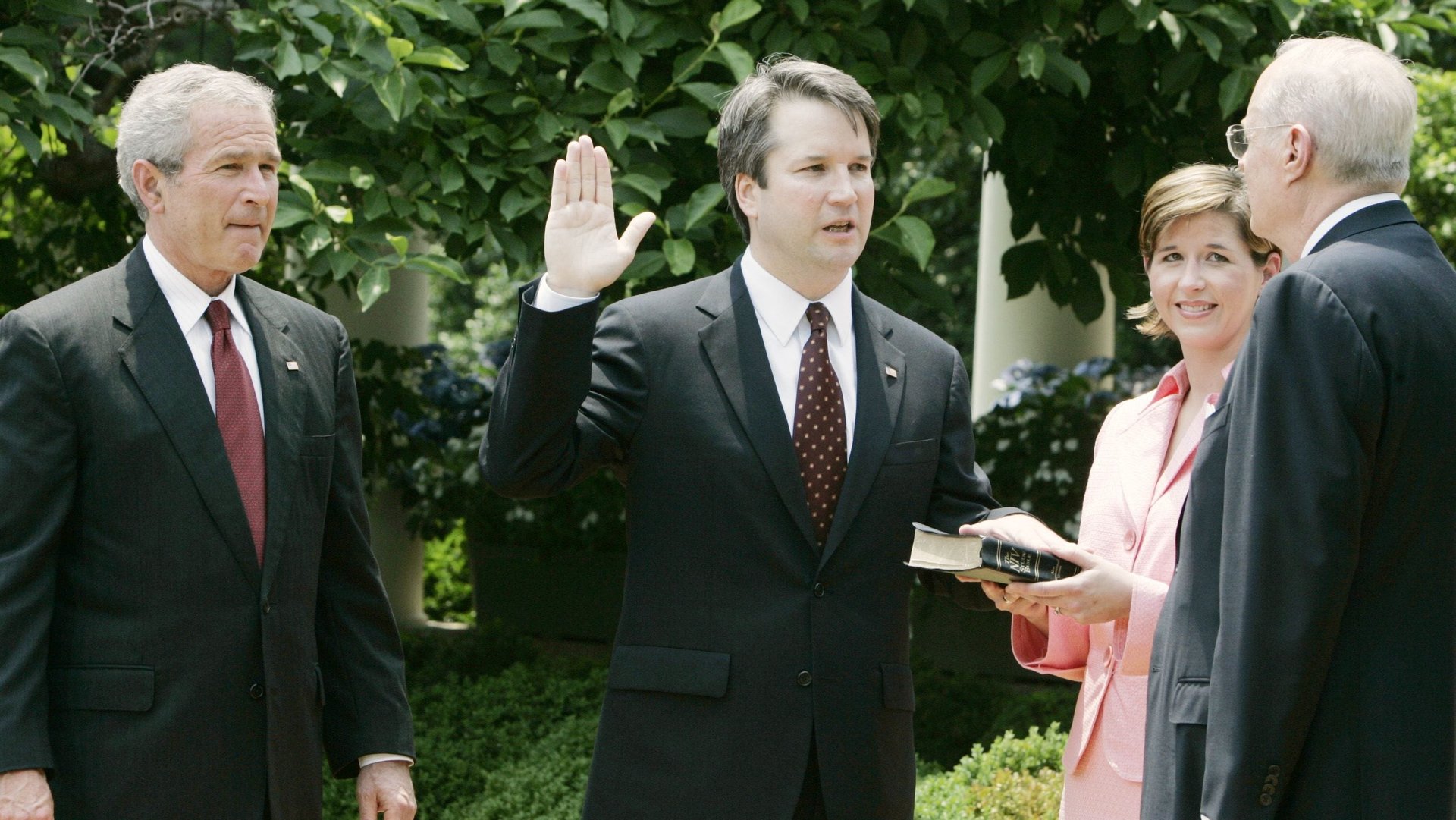Inexperienced and “sanctimonious:” Trump’s top Supreme Court pick was downgraded by peers
Brett Kavanaugh, a Washington, DC appeals court judge and former clerk for Supreme Court judge Anthony Kennedy, has quickly emerged as the top candidate to replace Kennedy when he retires.


Brett Kavanaugh, a Washington, DC appeals court judge and former clerk for Supreme Court judge Anthony Kennedy, has quickly emerged as the top candidate to replace Kennedy when he retires.
Kavanaugh was already on the White House’s short list of potential Supreme Court nominees, and Trump said June 27 that he consulted Kennedy about his replacement. Now DC political pundits and even online betting sites have Kavanaugh as the favorite. The choice would thrill many conservative Republicans (Kavanaugh recently questioned immigrants’ constitutional rights in a ruling on an undocumented minor who sought an abortion, among other right-leaning decisions), but threatens to intensify what’s already likely to be a bruising Senate nomination battle.
Kavanaugh has played a role in the several of the most important partisan battles in US politics over the past twenty years. As a young attorney in prosecutor Kenneth Starr’s office, he was the lead author of the salacious Starr Report calling for president Bill Clinton’s impeachment, and represented George W. Bush in the Florida vote recount that awarded the 2000 election to Bush. “You could not think of another nomination, given Mr. Kavanaugh’s record, more designed to divide us,” New York senator Chuck Schumer said in 2004, opposing Kavanaugh’s nomination to the appeals court.
Kavanaugh’s legal peers have raised concerns about potential partisan bias as well. In 2006, the American Bar Association’s “Standing Committee on Federal Judiciary” did a thorough review of Kavanaugh, part of a regular practice of evaluating nominees for judicial positions. This practice includes consulting dozens of lawyers, judges and others to gauge the depth of a nominee’s understanding of the law, their judgment, “freedom from bias, commitment to equal justice under the law,” and overall character.
The ABA also evaluated Kavanaugh in 2003. After its 2006 assessment, which included 91 interviews with judges, lawyers, and others, the ABA downgraded Kavanaugh from “Well Qualified” to “Qualified” for the job.
In 2003, “it was noted that he had never tried a case to verdict or judgment; that his litigation experience over the years was always in the company of senior counsel; and that he had very little experience with criminal cases,” the ABA’s 2006 report says. The additional interviews in 2006 “expanded upon those earlier concerns”:
One judge who witnessed the nominee’s oral presentation in court commented that the nominee was “less than adequate” before the court, had been “sanctimonious,” and demonstrated “experience on the level of an associate.” A lawyer who had observed him during a different court proceeding stated: “Mr. Kavanaugh did not handle the case well as an advocate and dissembled.” Other lawyers expressed similar concerns, repeating in substance that the nominee was young and inexperienced in the practice of law.
The report also raised questions about Kavanaugh’s ability to be balanced and fair:
Further, the 2006 interviews raised a new concern involving his potential for judicial temperament. Unlike the earlier 2003 final report and 2005 updated report, the recent supplemental evaluation contained comments from several interviewees with more recent experience with the nominee, which caused them to characterize the nominee as “insulated.” One interviewee suggested that much of his concern about the nominee being insulated was due, understandably, to the nominee’s current position as Staff Secretary to the President. However, this interviewee remained concerned about the nominee’s ability to be balanced and fair should he assume a federal judgeship. And another interviewee echoed essentially the same thoughts: “(He is) immovable and very stubborn and frustrating to deal with on some issues.”
The ABA’s assessment was criticized by the Bush White House, and later in 2006 Kavanaugh was confirmed by the US Senate to the DC Appeals Court by a 57 to 36 vote. In the over 10 years since then, he has “written almost entirely in favor of big businesses, employers in employment disputes, and against defendants in criminal cases,” according to blog Empirical SCOTUS, which broke down Kavanaugh’s nearly 300 rulings in the seat last year.